Twenty-five years after the deadly bombing of the AMIA Jewish community centre in downtown Buenos Aires, a court will today finally hand down a verdict on Argentina's worst ever terrorist attack. Former president Carlos Menem, his intelligence chief and the judge in charge of the initial probe face prison sentences if found guilty of staging a cover-up.
To date, nobody has been jailed for the attack on the Asociación Mutual Israelita Argentina (AMIA) centre on July 18, 1994, which killed 85 and injured over 300 people, though Argentina – and Israel – have long pointed the finger at Iran. Those responsible for the attack on the Israeli Embassy in 1992 also remain at large.
The verdict is expected at around 11am local time today, after the final statements of Menem and Hugo Anzorreguy, the country's former spy chief.
They are among a group defendants who could be incarcerated for a slew of corruption and obstruction of justice charges when a court in Buenos Aires hands down its verdict after a four-year trial.
Prosecutors have called for a four-year jail sentence for Menem, Argentina's head of state from 1989-1999, on grounds that he ordered a cover-up. Aged 88, the former president is expected to be in Buenos Aires' Comodoro Py courthouse Thursday when the verdict in the trial is read out.
False line of investigation
In total, 13 men stand accused of being involved in a cover up, including the former AMIA chief during the 1990s Rubén Beraja, whom prosecutors argued tried to divert authorities toward a false line of investigation.
The plaintiffs are three associations of victims and victims' relatives, who have long denounced the actions Beraja and others. They are joined by other Jewish community groups, the Justice Ministry and a group of falsely accused police officers.
"We hope they are all found guilty," Adriana Reisfeld, president of Memoria Activa, told AFP.
"The cover up is for us, 25 years later, just as important as the investigation of the attack itself, because they [the accused] have stopped us from learning the truth", she added.
Another defendant is former judge Juan José Galeano, who was indicted for his mismanagement of the investigation of the attack.
"These will be the first verdicts in the case, [since] cover up is also a crime," Reisfeld said.
In one of the last statements to the court, Galeano declared his innocence. He faces a potential 13 years behind bars.
"The investigation of the AMIA [attack] fell victim to the internal miseries of the intelligence services," he said.
The former judge is accused of paying US$400,000 to Carlos Telleldín, a merchant of stolen cars and a former police informer, to falsely accuse a group of police officers. Telleldín is accused of providing the van that was used to store the car bomb involved in the attack.
Galeano justified the payment to Telledín using funds from the Menem government because "it was indispensable" in order to unravel the truth behind the bombing. The former magistrate denied acting on behalf of the then-president.
Multiple offences
The 13 defendants face multiple charges including meddling with evidence, moral turpitude, cover up, abuse of authority and graft.
No group formerly claimed responsibility for the 1994 attack but the Argentine State has long accused a Lebanese Hezbollah operative and former officials of the Iranian government, among them former president Ali Rafsanjani, of preparing and executing the attack. Israel also blames Tehran.
The accused Iranian has refused to be interrogated by Argentine authorities and rejects the charges.
Public prosecutors have demanded four years' prison for Menem who stands accused of ordering former judge Galeano to cease exploring the so-called "Syrian theory." That line of investigation suggested that a Syrian foreign national, Alberto Kanoore Edul, and other business people, purchased the explosive material used in the attack, ammonal.
The Menem and Kanoore families have a long-held familial relationship, and their family ties go back to their respective grandfathers' lives in the Syrian city of Yabrud. Menem and Kanoore Edul were boyhood friends.
One unproven hypothesis was the supposed revenge of the Syrian and Libyan governments, from which Menem had supposedly received money for his election campaign, but under pressure from the United States had refused to provide Argentine military material.
Another line of thought centred on far-right anti-Semitic Argentine groups but remains unproven.
Prosecutor Miguel Yivoff voiced regret during the trial that one lead in the case, known as the Syrian track, was ruled out during the investigation.
Presidential questions and state secrets
In his evidence to the trial, Menem was enigmatic, deepening the mystery by effectively saying state secrets meant he was prevented from presenting bombshell evidence.
His lawyer explained to the court in 2016 that Menem "could reveal secrets to testify but for State security reasons this would affect the current government, the interests of the nation and the pacific relationship [Argentina has] with other nations."
Menem was sentenced to seven years in prison in 2013 for violating an international arms embargo in a weapons deal. Again, in 2015, he received a four-and-a-half-year sentence for bribing officials. But his status as a sitting member of the Senate means that he has, so far, benefited from immunity from imprisonment.
Former president Cristina Fernández de Kirchner is also being investigated in a separate investigation, after having been indicted in 2017 for participating in her own alleged cover-up, this time related to her government's controversial memorandum of understanding (MOI) signed with with Tehran in 2012.
At the time, then then-president had the Congress' backing for a the deal, which would have allowed allow Iranian suspects be questioned in their own country by Argentine prosecutors.
Tehran did not comply with the agreement, however, nor was the deal ratified by the Iranian government. Prosecutors investigating Fernández de Kirchner for corruption say the deal was effectively a cover-up to absolve Iran in return for lucrative trade deals with her government.
- AFP/TIMES












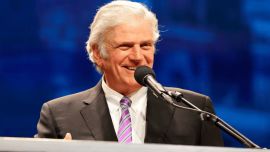
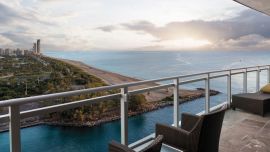







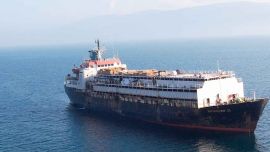


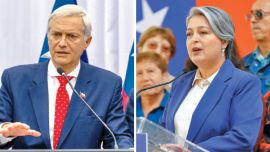
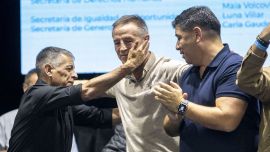
Comments